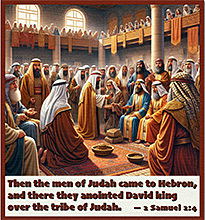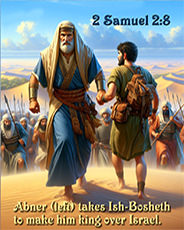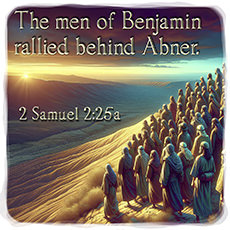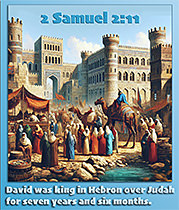2 Samuel 2:1–32 . . . Bible Study Summary with Videos and Questions
“David’s Anointing Followed by War”
Chapter 2 of Second Samuel introduces us to numerous characters. To read helpful profiles of each person, check out the character links in the first paragraph of our “Introduction of 2 Samuel” summary, shown here.
In a nutshell, today’s text can be summarized accordingly: David will be anointed king in Hebron but over Judah only. Saul’s son, Ish-Bosheth, will be taken by Abner to Mahanaim where he’ll be appointed king of Israel. The two sides will meet at Gibeon where, after a fierce battle, David’s side wins. Joab’s brother, Asahel, who’s David’s commander, will search for Abner, but Abner will overcome Asahel’s pursuit. We’ll also be introduced to two of David’s wives: Ahinoam and Abigail. Get ready for the next act in this novel to play out dramatically.
Second Samuel is a continuation of First Samuel, centering on one man: David. The story of David is a picture for us of what happens in a Christian’s life when he surrenders his will to God’s. Every Christian is offered a kingdom, just as David was offered one. That kingdom is the kingdom of your own life and it’s exactly like the kingdom of Israel. There are enemies threatening it from outside, as well as from within, to undermine it.
The kings of Israel were never able to get rid of the Philistines, the Ammonites, the Jebusites, the Perizzites, and all the other “-ites” of that day who form a picture for us of those internal enemies who threaten to undermine and overthrow the dominion that God intends us to have, as we learn to yield to and follow Christ Jesus.
[Note: Click the link to This Week’s Passage near the bottom of this page to read today’s Scripture.]
David’s Move to Hebron (2 Samuel 2:1–7)
David Anointed King Over Judah
2 1In the course of time, David inquired of the Lord. “Shall I go up to one of the towns of Judah?” he asked.
The Lord said, “Go up.”
David asked, “Where shall I go?”
“To Hebron,” the Lord answered (2 Samuel 2:1).
David again expressed his dependence on God by asking: (1) if it was the right time for him to move back into Judah, and (2) where God wanted him to relocate. (He probably used the sacred lots — the ephod’s Urim and Thummim — [cf. 1 Sam. 14:37–42; 23:9–11; 30:7–8] or consulted a seer.) He realized that he couldn't make the wisest choices alone because he didn't have God's perspective. He wanted God to use him most effectively, so he trusted God to place him in one very God-honoring spot (cf. Proverb 3:5–6).
Hebron, in the territory of Judah was a divine choice. It was David’s tribal homeland and where he had the greatest acceptance, being about 25 miles northeast of Ziklag and 19 miles south-southwest of Jerusalem. If you think that national politics today are nasty, take a look at the political intrigue that went on behind the scenes, which finally resulted in David becoming king of all Israel. Politics was bloody!
We see that v. 1 provides the key to David’s triumphs, namely his dependence on God. However, v. 2 introduces us to his tragedy, namely, his relationships with women. [Note: Michal, David’s first wife, isn’t mentioned because Saul had taken her from David and had given her to another man (cf. 1 Sam. 25:42–44).] This was David’s second anointing of three (cf. 1 Sam. 16:13); it represented a formal acknowledgment that the people of Judah viewed David as the Lord’s anointed.
It’s been at least 15 years since David was first anointed by Samuel as king. It’s time for David to finally become king as God had planned. Life had changed considerably for David. He’d been a fugitive for probably more than five years. Now, however, no one was hunting him down to take his life! It was time for him to leave the desert town of Ziklag on Judah’s perimeter. But before he’d do anything, he’d seek the Lord’s will for him, as he’d done in v. 1. As the new king of Judah, he graciously honored the men of Jabesh, Gilead for burying Saul’s body, even though he wasn’t king over their tribe. In reaching out to them, he sought to make friends who’d eventually make him king over all Israel (vv. 5–7).
Now that he could finally settle down, David began to raise a family in Hebron. He and his wives and his men and their families settled in the ancient city of Hebron and its surrounding villages, probably with the Philistines’ consent, since David was still Achish’s vassal. His final break with the Philistines won’t happen until later (5:17).
In vv. 4b–7, we see how David sought peace and unity with those who’d been loyal to Saul in Israel. He first took the initiative to contact them (v. 5a); he paid them a sincere compliment (v. 5b); he obliquely reminded them that he was now the Lord’s anointed (v. 6); finally, he offered a “treaty of friendship” (vv. 6b–7). His support at this time came mainly from the Judahites; for many generations, hostilities had existed between the Israelites in the northern tribes and those in the South. Presumably, the first recorded act of Judah’s new king was to offer friendship and comfort to a group of Israelites, implying that, although David had been a Judaean, his heart belonged to all Israel.
Ish-Bosheth Reigns Over the Northern Tribes (vv. 8–11)
The balance of this chapter’s text can be titled “War Between the Houses of David and Saul.” At this point, Saul’s only remaining son, Ish-Bosheth, reigned over the northern tribes. [There is no previous mention of Ish-Bosheth among the sons of Saul, so it’s possible that he was an illegitimate son or the son of a concubine.] David’s overtures to the Jabesh-Gileadites were very important. Saul’s commander-in-chief and cousin Abner was working to install Saul’s youngest son, Ish-Bosheth (Abner’s nephew), as Saul’s successor. This wasn’t a move that Yahweh had ordained (cf. 1 Sam. 13:14); David was God’s anointed! Abner was simply doing what was customary in the ancient Near East while attempting to secure his own future. His initiative ignited conflict between Saul’s and David’s houses that occupied the writer’s attention throughout vv. 8–32.
8Meanwhile, Abner son of Ner, the commander of Saul’s army, had taken Ish-Bosheth son of Saul and brought him over to Mahanaim. 9He made him king over Gilead, Ashuri, and Jezreel, and also over Ephraim, Benjamin, and all Israel.
10Ish-Bosheth son of Saul was forty years old when he became king over Israel, and he reigned two years. The tribe of Judah, however, remained loyal to David (2 Sam. 1:8–10).
Abner had been Saul’s military commander, the real power in the kingdom, since Saul was dead. He was Saul’s uncle, Ish-Bosheth’s great-uncle (1 Sam. 14:50). Thus, Ish-Bosheth had “family blood.” So, in loyalty to his family’s house, Abner set Ish-Bosheth on the throne, “making him king.” Ish-Bosheth seems to have been a weak king, kept in power only by Abner’s influence and military clout. For fear of the Philistines who then controlled much of the hill country, Abner had moved Ish-Bosheth from Saul’s capital of Gibeah to Mahanaim, on the east side of the Jordan, where Jacob had wrestled with the angel, 800 years earlier (Genesis 32:1–2). Here the monarchy of Saul’s house might be reestablished in relative safety. Ish-Bosheth’s territory, however, had become substantially diminished. Though Gilead was fairly secure, the areas of Asher and Jezreel, plus part of Ephraim and Benjamin, were now controlled by the Philistines.
“Ish-Bosheth” (literally “Man of Shame”) appears only in chapters 2–4. Since he didn’t die in battle with Saul and his brothers, he may have been a bitcowardly, since Abner rather than he, was the real leader of Saul’s forces. The Judeans made David their king (v. 4), but Abner single-handedly made Ish-Bosheth king over “all Israel” (v. 9), which wasn’t God’s will, since He’d chosen David to succeed Saul. Abner’s act fueled conflict between the northern and southern inhabitants of the land.
Seven and one-half years later, when David eventually became king of all Israel and Judah, he ended Ish-Bosheth’s two-year reign. It had taken Abner more than five years to establish Ish-Bosheth’s reign on Israel’s throne, putting his personal preferences and cultural precedent (that a son of Saul would succeed his father) over God’s will. Consequently, life became very complicated; problems followed in Israel, as always happens when people behave, as self-willed Abner had done.
There’s a modern touch to this scenario, for our political and religious worlds are populated by these same three kinds of people: (1) We have weak people like Ish-Bosheth, who succeed because they have connections; (2) we have strong, selfish people like Abner, who know how to manipulate others for their own personal profit; and (3) we have people of God, like David, who are called, anointed, and equipped, but know to wait for God’s timely indicator before they follow and serve Him.
War with Much Slaying (vv. 12–32)
12Abner son of Ner, together with the men of Ish-Bosheth son of Saul, left Mahanaim and went to Gibeon. 13Joab son of Zeruiah and David’s men went out and met them at the pool of Gibeon. One group sat down on one side of the pool and one group on the other side (2 Sam. 1:12–13).
Today’s tourists can visit the Pool of Gibeon, being about three miles northwest of Gibeah. It was evidently meant to store rainwater or to provide access to the water table. It was at that pool that the forces of Ish-Bosheth and David met for a “peace conference” (v. 13). However, Abner broke off the peace-talks when he suggested that both sides determine who’d win in a “battle of champions.” Twelve soldiers from each side (v. 15), perhaps representing each of the twelve tribes, engaged in hand-to-hand combat to decide the leadership of the nation — probably two soldiers fought at a time. The bloody contest was a draw, causing the battle between the two armies to escalate the conflict. Joab’s men finally got the upper hand.
Josephus wrote that Asahel (read v. 18 again) “ran so fast that he could outrun a horse.” Abner warned Asahel twice to stop pursuing him and to fight with someone he might be able to defeat (vv. 21–22). He evidently wanted to avoid a blood feud with Joab’s family that might go on for generations. Nevertheless Asahel kept pushing Abner, who finally killed him rather than simply knock him out. Verse 23’s “Every man stopped when he came to the place where Asahel had died” refers to David’s men, Asahel’s pursuers, who stood transfixed in horror at the death of a fallen comrade.
Many of David’s soldiers stopped but Joab and Abishai continued to pursue Abner. Other soldiers from Benjamin (Saul and Abner’s tribe), rallied around Abner; the hostility climaxed when they defended themselves on a hilltop (v. 25). Abner tried to call a truce (v. 26), but Joab correctly blamed him for starting the conflict (v. 27; cf. v. 14). Joab agreed to the truce and both armies went home. Soon, the armies engaged each other in a major skirmish: “The battle that day was very fierce, and Abner and the Israelites were defeated by David’s men” (v. 17). Abner’s army retreated back to Mahanaim, but not before losing 360 men, compared to only 19 losses for David’s army (vv. 30–31).
In summary: Joab’s army pursued the retreating soldiers. His brother, Asahel, was intent on killing Abner, Ish-Bosheth’s general. Asahel chased Abner to the point that he was so close that he was in danger of being killed by Abner who gave fair warning that he didn’t want to kill him. Finally, his life at risk, Abner apparently stopped suddenly, causing fast-running Asahel to impale himself on Abner’s spear. Defending himself in war, Abner’s killing of Asahel wouldn’t constitute blood-guilt objectively. Nevertheless, all Joab was able to see was that Abner had killed his brother, so he sought revenge when given the chance, which the author will disclose to us in next week’s summary (3:27).
This incident accounts for the personal hostility that would later result in Abner’s death and the disintegration of Ish-Bosheth’s throne. Note that David played no part in this. God worked through Joab and Abner to place His anointed on the throne of all Israel. This passage shows how hostilities between the two factions in Israel escalated, as they often do in modern nations, neighborhoods, and families. First, the opposing parties stopped talking (v. 12). Next, they started fighting (v. 13). Then, Asahel kept pushing (v. 23). Finally, Abner refused to forgive and reconcile, insisting on defending himself and seeking revenge (v. 23).
May we hearty followers of God avoid the ways of the world by seeking and prioritizing only Him and His ways.
† Summary of 2 Samuel 2:1–32
This next passage describes the beginning of David’s reign and the deepening division within Israel following Saul’s death. David seeks the Lord’s guidance and is directed to go to Hebron, where the people of Judah anoint him king over their tribe, and he reigned seven and a half years. David reaches out to the men of Jabesh-Gilead, commending them for their loyalty in burying Saul and encouraging them to stand with him as Judah’s new leader (2:1–7). Meanwhile, Abner, Saul’s military commander, installs Saul’s son IIsh-Bosheth as king over the northern tribes, setting up a rival rule centered in Mahanaim and precipitating a split within the nation (vv. 8–11).
Tensions escalate when the armies of David (led by Joab) and IIsh-Bosheth (led by Abner) meet at the pool of Gibeon. A fierce confrontation ensues, beginning with a deadly contest between twelve men from each side and quickly erupting into a broader battle. David’s forces prevail, inflicting significant losses on Abner’s men, but Asahel, Joab’s brother, is killed by Abner during the pursuit (vv. 12–23). The conflict ends only when Abner calls for a halt, warning against further bloodshed; both sides then withdraw — Abner’s men to Mahanaim and Joab’s to Hebron (vv. 24–32). The chapter closes with a stark reminder of the cost of civil strife, as the losses are counted and both leaders regroup.
Key points with verse references:
• David seeks God’s guidance, moves to Hebron, and is anointed king over Judah (vv. 1–4).
• David honors the men of Jabesh-Gilead for their loyalty to Saul and encourages their allegiance (vv. 5–7).
• Abner makes IIsh-Bosheth, Saul’s son, king over Israel’s northern tribes, causing a national division (vv. 8–11).
• Hostilities erupt between Abner’s and Joab’s armies at Gibeon, leading to a bloody battle and Asahel’s death by Abner’s hand (vv. 12–23).
• Abner calls for an end to the conflict; both armies withdraw, and the chapter concludes with a count of the dead (vv. 24–32).
This passage sets the stage for David’s gradual ascent to kingship over all Israel, while also showing the deep wounds and rivalries left in the nation after Saul’s death.
This Week’s Passage
2 Samuel 2:1–32
New International Version (NIV) [View it in a different version by clicking here; also listen to chapter 2 narrated by Max McLean.]
Summary Video: “The Second Book of Samuel”
† Watch this introductory video clip created by BibleProject on bibleproject.com.
- Q. 1 What do you think motivated Abner to make unassertive Ish-Bosheth king over Israel?
- Q. 2 What’s the record regarding your attempts to make peace between King Jesus and King Self?






